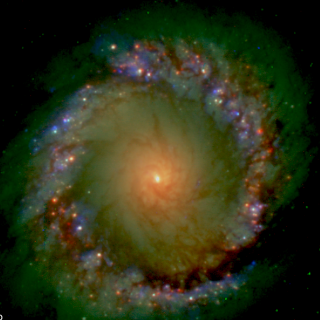Mezcua, M.; Prieto, M. A.
Referencia bibliográfica
The Astrophysical Journal, Volume 787, Issue 1, article id. 62, 10 pp. (2014).
Fecha de publicación:
5
2014
Revista
Número de citas
49
Número de citas referidas
46
Descripción
The nuclear radio emission of low-luminosity active galactic nuclei
(LLAGNs) is often associated with unresolved cores. In this paper we
show that most LLAGNs present extended jet radio emission when observed
with sufficient angular resolution and sensitivity. They are thus able
to power, at least, parsec-scale radio jets. To increase the detection
rate of jets in LLAGNs, we analyze subarcsecond resolution data of three
low-ionization nuclear emission regions. This yields the detection of
extended jet-like radio structures in NGC 1097 and NGC 2911 and the
first resolved parsec-scale jet of NGC 4594 (Sombrero). The three
sources belong to a sample of nearby LLAGNs for which
high-spatial-resolution spectral energy distribution of their core
emission is available. This allows us to study their accretion rate and
jet power (Q jet) without drawing on (most) of the ad hoc
assumptions usually considered in large statistical surveys. We find
that those LLAGNs with large-scale radio jets (>100 pc) have Q
jet > 1042 erg s–1, while the
lowest Q jet correspond to those LLAGNs with parsec-scale
(<=100 pc) jets. The Q jet is at least as large as the
radiated bolometric luminosity for all LLAGN, in agreement with previous
statistical studies. Our detection of parsec-scale jets in individual
objects further shows that the kinematic jet contribution is equally
important in large- or parsec-scale objects. We also find that the
Eddington-scaled accretion rate is still highly sub-Eddingtonian
(<10–4) when adding the Q jet to the
total emitted luminosity (radiated plus kinetic). This indicates that
LLAGNs are not only inefficient radiators but that they also accrete
inefficiently or are very efficient advectors.
Proyectos relacionados

Centros de Galaxias a Escalas de Parsecs y Técnicas de Alta Resolución Espacial
Proyecto enfocado al estudio en el IR del núcleo de las galaxias más cercanas con resoluciones espaciales en el rango de 1 a 10 pc. Estas resoluciones espaciales, accesibles con los grandes telescopios de tierra usando técnicas frontera de observación, son por primera vez comparables a las que se obtienen rutinariamente con HST en el óptico y VLBI
Almudena
Prieto Escudero